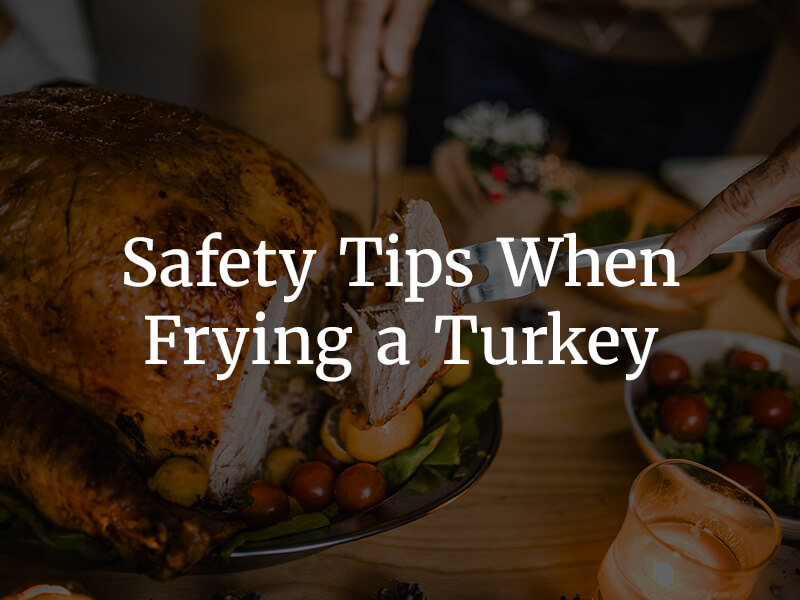Frying a Turkey? Follow These Safety Tips
You might think a crisp exterior and juicy interior is worth the risks of frying a turkey…until you know the facts. Turkey deep fryers have caused so many burn injuries on past Thanksgivings that the National Fire Protection Association (NFPA) has officially advised consumers against them. The NFPA believes turkey fryers that use cooking oil are unsuitable for safe use even for informed and careful consumers. If you still wish to fry your turkey this Thanksgiving, do so with the utmost care. Follow a few key safety rules to help prevent a holiday disaster this year.

5 Tips on Staying Safe
Preparation is key when deep-frying a turkey. Have a fire evacuation plan in place that your family has memorized and practiced. A fire evacuation plan is wise for all families, regardless of how you plan on cooking your turkey this Thanksgiving. Revisiting your plan before taking on a dangerous task such as frying a turkey, however, could be helpful in an emergency. Help prevent fires while deep frying with basic safety tips.
- Use an oil-less turkey fryer: You do not have to give up the taste of fried turkey to stay safe this Thanksgiving. Invest in a fryer that uses infrared technology or air instead of oil to achieve the same taste with less risk.
- Keep the fryer away from your home: If you wish to use a traditional oil-based fryer, position it at least 10 feet away from any buildings or trees. Never use a deep fryer in your home, garage or shed.
- Follow the directions: Keep the instructions your deep fryer came with and reread them before each use. Follow the directions exactly in terms of setup, use, maintenance and cleaning.
- Thaw your turkey: Be certain your turkey has properly and completely thawed before dropping it into a fryer. Defrost your turkey in the refrigerator, not on the counter, to help prevent salmonella. For reference, a 16-pound turkey will take four to five days to thaw.
- Prepare yourself: Invest in the proper cooking gear, including goggles, before deep-frying a turkey. Have a grease-rated fire extinguisher nearby in case of a fire. Keep all kids, pets and yard debris at least three feet away from your fryer while in use.
If you have any doubts about using a traditional turkey fryer, opt to bake your bird this Thanksgiving instead. Only a chef with experience using a hot oil fryer should attempt to deep fry a turkey. Even seasoned cooks could run into trouble with splashing or splattering oil, an overfilled fryer, a fryer tipping over, a defective thermostat, oil combustion, and many other potential risks that could cause fires and/or serious burn injuries.
Thanksgiving Fire Facts
Even before the deep-fried turkey trend took over, Thanksgiving was the most dangerous holiday of the year in terms of house fires. From 2014 to 2016, an estimated 2,400 house fires occurred on Thanksgiving Day each year. These fires caused an average of 5 deaths and 25 injuries per year. The majority of these fires originated in the kitchen. Home cooking fires can occur due to unattended cooking, oil or grease, heating equipment, and combustibles too near heat sources. Help prevent fires this Thanksgiving by supervising things in the kitchen, keeping kids out and checking all appliances and equipment for wear and tear before use.
Another way you can prevent fires this Thanksgiving is through smart decorating. Do not decorate with real candles or lanterns. Instead, swap them for electric to decrease the risk of a fire. Avoid decorating with combustibles such as dried flora, paper garlands and leaves. Check all electrical cords for damage or cracks before using. Never use cords outside that the manufacturer only intended for use indoors. Check your smoke detectors at least once per month for optimal fire safety. If a fire starts, call 911 immediately.

